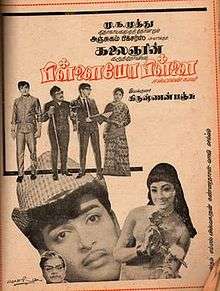Pillaiyo Pillai
| Pillaiyo Pillai | |
|---|---|
 Theatrical Poster | |
| Directed by | Krishnan Panju |
| Produced by | Murasoli Maran |
| Written by | M. Karunanidhi |
| Starring |
M. K. Muthu, Lakshmi R. S. Manohar C. R. Vijayakumari |
| Music by | M. S. Viswanathan |
Production company |
Anjugam Pictures |
Release dates | 1972 |
Running time | 125 Mins |
| Country | India |
| Language | Tamil |
Pillaiyo Pillai is 1972 Tamil Romance - Drama film directed by Krishnan-Panju and produced by Murasoli Maran. The script were written by M. Karunanidhi.[1][2] Music by M. S. Viswanathan assets to the soundtrack. It stars M. K. Muthu (played dual role), in his debut film appearance as the central character along with R. S. Manohar, C. R. Vijayakumari, Laskhmi and M. R. R. Vasu in other prominent role.[3][4][5]
Plot
The story deals with a villain Ganngatharan(R. S. Manohar), who masquerades as a noble man in public. Besides being a womeniser. He also involved in the robbing of temple sculptures. He kills his first wife(G. Sakunthala) and foists the crime on his servant Murugan(M. R. R. Vasu). He later escapes from prison and kidnaps Gangatharan's son(M. K. Muthu) and raise from him as his own. Gangatharan gets remarried to Kanchana(C. R. Vijayakumari), whom murugan kidnaps. But he releases her, when kanchana confesses that she's bearing child. When Gangatharan learns of his wife's pregnancy, he drives her away, she gives birth to son(played M. K. Muthu again). Years roll by and the boy raised by Murugan, Kumar become a doctor. Kanchana's son Kannan grows up to become straight forward and hard working person. Confusion ensures as the public prosecutor's daughter falls in love with one of the sons, often mistaking Kannan for Kumar. As part of his plans to wreak vengeance. Gangatharan accuses kumar of stealing a ring and beats him up. How the problems are solved forms the rest of the story.[1][2]
Cast
- M. K. Muthu as Kumar/Kannan
- R. S. Manohar as Gangatharan
- C. R. Vijayakumari as Kanchana, Gangatharan's Second Wife
- Lakshmi
- Nagesh
- Sachu
- M. R. R. Vasu as Murugan, Gangatharan's house Servant
- S. Varalakshmi
- V. K. Ramasamy
- M. S. Sundari Bai
- G. Sakunthala as Gangatharan's First Wife
- Thengai Srinivasan
- C. K. Saraswathi
- Nambi Rajan
- Puthur Natarajan
- Dhandayudhapani
- Ramanathan
- Vasanthakumar
- Shanmugam
- Kallapart Natarajan
Box office
Randor Guy stated his article M. K. Muthu, the eldest son of M. Karunanidhi, made a spectacular acting debut in his father's productions Pillaiyo Pillai under the family banner of Anjugam Pictures. The film was a Box - Office success and celebrated 100 days in Many Centers.[1][2]
Soundtrack
| Pillaiyo Pillai | |
|---|---|
| Soundtrack album by M. S. Viswanathan | |
| Released | 1972 |
| Recorded | 1972 |
| Genre | Sareegama |
| Length | 21:12 |
| Language | Tamil |
| Producer | M. S. Viswanathan |
Music by M. S. Viswanathan and lyrics written by Kannadasan and Vaali.[6] The playback singers consists of T. M. Soundararajan, P. Suseela - A. L. Raghavan L. R. Eswari. The film's music was major highlights with duet Moondru Thamizh Thondriyathum unnidamo(sung by T. M. Soundararajan and P. Suseela) become a huge hit.[1][2]
| No | Songs | Singers | Lyrics | Length(m:ss) |
|---|---|---|---|---|
| 1 | Ezhaiyin Sirippil Iraivan | T. M. Soundararajan | Vaali | 04:19 |
| 2 | Moondru Thamizh Thondriyathum | T. M. Soundararajan P. Suseela | 04:14 | |
| 3 | Vellai Malaril Oru Vandu | P. Suseela | Kannadasan | 03:17 |
| 4 | Gundooru Hamumanthappa Enga | T. M. Soundararajan A. L. Raghavan L. R. Eswari | Vaali | 04:21 |
| 5 | Meenattam Kann Konda Meenakshi | T. M. Soundararajan, P. Suseela | 05:01 |
References
- 1 2 3 4 Randor Guy (July 9, 2016). "Blast from the Past - Pillaiyo Pillai 1972". "The Hindu". Retrieved 2016-08-09.
- 1 2 3 4 Randor Guy (July 10, 2016). "Todays Paper - Pillaiyo Pillai 1972". "The Hindu". Retrieved 2016-08-09.
- ↑ "Pillayo Pillai". spicyonion. Retrieved 2016-08-09.
- ↑ "Pillaiyo Pillai Movie". gomolo. Retrieved 2016-08-09.
- ↑ http://tamilrasigan.com/pillayo-pillai-1972-tamil-movies-online-watch-free/
- ↑ "Pillaiyo Pillai 1972". mio. Retrieved 2016-08-09.